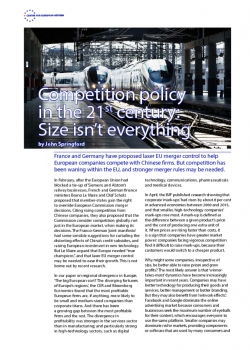
Competition policy in the 21st century: Size isn't everything
France and Germany have proposed laxer EU merger control to help European companies compete with Chinese firms. But competition has been waning within the EU, and stronger merger rules may be needed.
In February, after the European Union had blocked a tie-up of Siemens and Alstom’s railway businesses, French and German finance ministers Bruno Le Maire and Olaf Scholz proposed that member-states gain the right to override European Commission merger decisions. Citing rising competition from Chinese companies, they also proposed that the Commission consider competition globally, not just in the European market, when making its decisions. The Franco-German ‘joint manifesto’ had some sensible suggestions for curtailing the distorting effects of China’s credit subsidies, and raising European investment in new technology. But Le Maire argued that Europe needed “true champions”, and that laxer EU merger control may be needed to ease their growth. This is not borne out by recent research.
In our paper on regional divergence in Europe, ‘The big European sort? The diverging fortunes of Europe’s regions’, the CER and Bloomberg Economics found that the most profitable European firms are, if anything, more likely to be small and medium-sized companies than corporate titans. And there has been a growing gap between the most profitable firms and the rest. The divergence in profitability was stronger in the services sector than in manufacturing; and particularly strong in high-technology sectors, such as digital technology, communications, pharmaceuticals and medical devices.
In April, the IMF published research showing that corporate ‘mark-ups’ had risen by about 8 per cent in advanced economies between 2000 and 2015, and that smaller, high-technology companies’ mark-ups rose most. A mark-up is defined as the difference between a given product’s price and the cost of producing one extra unit of it. When prices are rising faster than costs, it is a sign that companies have greater market power: companies facing vigorous competition find it difficult to raise mark-ups, because their customers would switch to a cheaper product.
Why might some companies, irrespective of size, be better able to raise prices and grow profits? The most likely answer is that ‘winner-takes-most’ dynamics have become increasingly important in recent years. Companies may have better technology for producing their goods and services, better management or better branding. But they may also benefit from ‘network effects’: Facebook and Google dominate the online advertising market because consumers and businesses seek the maximum number of eyeballs for their content, which encourages everyone to use the same platform. Smaller companies may dominate niche markets, providing components or software that are used by many consumers and businesses. These dynamics mean that companies that are only a little better than the competition gain disproportionate market share.
Stronger merger control, not weaker, may be necessary to prevent already dominant companies from gobbling up smaller competitors, especially in sectors with persistently high profits: Facebook’s purchase of WhatsApp is an obvious example. At present, competition authorities tend to focus on mergers of large companies.
Competition can also be promoted with a broader set of policy tools. The EU should carry on trying to increase trade and foreign direct investment, both within Europe and with the rest of the world. That would allow foreign companies to compete against domestic incumbents. Pro-market regulations can help to reduce barriers to entry: ensuring that consumers can easily take their phone numbers, bank account details and other forms of data to alternative providers makes it easier for them to switch to cheaper or better services.
Reforms to Europe’s corporation tax regimes would also help. Large multinational companies are better able to shift profits between jurisdictions in order to avoid corporate tax. This means that smaller, largely domestic companies face a higher tax burden. Moves towards a more destination-based corporate tax system would help to promote competition, by ensuring that multinational companies paid more corporation tax to member-states that provided a larger proportion of their revenues, making the tax rate for multinationals and domestic companies more equal.
The EU needs a broader, more thoughtful competition strategy than France and Germany have so far proposed. While China’s system of subsidised credit distorts global competition, allowing member-states to intervene in EU merger decisions would add discretion to a system that should be rules-based. Competition Commissioner Margrethe Vestager pointed out at a CER event in May that competition decisions are legally actionable, so would companies be able to take the European Council to the European Court of Justice? And the Commission would struggle to stop member-states from intervening in its decisions in order to advance the interests of favoured companies.
Creating European champions to counteract Chinese subsidy may distort competition within Europe, by creating companies with more power in the European market. That may raise prices and lower innovation. A better long-term strategy would be to strengthen multilateral rules, by working with the US to designate China’s banking system as a ‘public body’, which would mean that countervailing duties could then be applied to Chinese exporters who benefit from subsidised credit.
In the 21st century economy, size matters less than it used to. Smaller companies can dominate niche markets if they have a product that is marginally better than their competitors, or if they have already amassed a network of consumers and businesses. And larger companies strategically purchase smaller companies with an eye on their future profits. The welfare of consumers will be served by stronger merger control, not weaker.
John Springford is deputy director of the Centre for European Reform.

